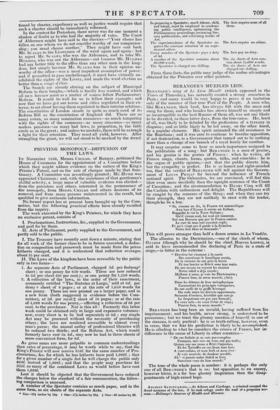PRINTING MONOPOLY—DIFFUSION OF THE LAWS.
IN November 1830, Messrs. CHILDS, of Bungay, petitioned the House of Commons for the appointment of a Committee before which they might adduce evidence on the nature of the King's Printer's Patent, and on the rate of charges made by that func- tionary. A Committee was accordingly granted; Mr. HumE was appointed Chairman; and, with the assistance of that gentleman's skilful activity, a large mass of valuable evidence was elicited— from the patentees and others interested in the permanence of its removal, monopoly, from Messrs. CHILDS and others desirous of removal, and from many persons uninterested in the result, but qualified to give authentic information. No formal report has at present been brought up by the Com- mittee, but the following practical effects have already resulted from the inquiry. The work executed by the King's Printers, for which they have an exclusive patent, consists of I. Proclamations, Instructions, &c., supplied to the Government, and paid for by them.
II. Acts of Parliament, partly supplied to the Government, and partly sold to the public.
I. The Treasury have recently sent down a minute, stating that for all work of the former class to be in future executed, a deduc- tion on composition and presswork must be made from the prices hitherto charged, and it is understood that reduction averages about 35 per cent.
II. The Laws of the kingdom have been accessible by the public only in two forms- ]. As separate Acts of Parliament, charged 3d. per foolscap* sheet ; or one penny for 830 words. These are now reduced to 2d. per sheet (66 per cent.); or one penny for 1,250 words. 2. A collection of the laws, in the order of their enactment, commonly entitled "The Statutes at Large," sold at 6d. per demy .1. sheet of 8 pages ; or at the rate of 1,650 words for one penny. These are now printed on a larger paper, and in a new form (both suggested in evidence before the Com- mittee), at 2d. per royal* sheet of 16 pages; or at the rate of 4,800 words for one penny,—effecting a reduction of 66 per cent, to the purchaser. Nor is this all : Formerly this latter work could be obtained only in large and expensive volumes: now, every sheet is to be had separately at 2d.; any single Act may be procured without the necessity of purchasing others ; the laws are rendered accessible to almost every man's purse; the annual outlay of professional libraries will be reduced two thirds; and the Reform Act, which would formerly have cost 3s. 6d., may now be had in three sheets of more convenient form, for 6d.
As gross sums are more palpable to common understandings than rates of percentage, it may be worth while to say, that the King 'sprinter will now receive 650/. for the same number of Pro- clamations, &c, for which he has hitherto been paid 1,000!.; that for a given number of a single Act he will _charge the public only 660/. instead of 1,000/.; and that the people may purchase for 335/. as many of the combined Laws as would before have cost them 1,000/.
Lest it should be objected that the Government have reduced the charges below the standard of a fair remuneration, the follow- ing comparison is annexed. A number of the Spectator contains as much paper, and in the same form, as six sheets of the separate Acts. * Size-121 inches by 16i. f Size-17j inches by 221. $-SiZe-20 inches by 26.
In preparing a Spectator, much labour, skill, The Acts require none of all and talent, must be employed in condens- these. ing public intelligence, epitomizing the Parliamentary proceedings, reviewing lite- rary publications, and criticizing works of Art.
The superintendence of the Spectator re- The Acts require no editor. quires the constant attention of an expe- rienced editor.
Every number of the Spectator pays a duty The Acts pay no duty. of 4d.
A number of the Spectator contains about The six sheets of Acts con-.
60,000 words. tam about 15,000 words.
The Spectator is charged one shilling. The six sheets of Acts are charged one shilling.
From these filets, the public may judge of the undue advantages obtained for the Patentee over other printers.


























 Previous page
Previous page